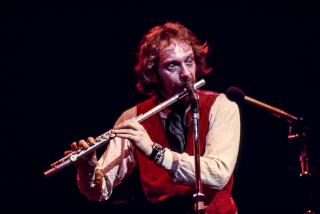Music Reviews : Jean-Pierre Rampal
- Share via
Jean-Pierre Rampal’s program Sunday night at Royce Hall listed a variety of Baroque and Classical works for flute accompanied by harpsichord or fortepiano. Before the evening was out, the modern keyboard descendant of those instruments made an unscheduled appearance.
Assisted at the harpsichord by his longtime associate John Steele Ritter, Rampal opened with compositions by Rameau (“Troisieme Concert,” in A), J.S. Bach (Trio Sonata in E minor), and Cambini (Variations on “Marche de Marseillaise”).
Playing from the printed scores throughout the evening, this consummate flutist offered an abundance of dulcet sounds and delicate filigree. Suitably understated balances and subtle virtuosity distinguished the Rameau and Cambini works from a stronger, more substantial approach to Bach.
Ritter moved to the fortepiano for Devienne’s Sonata No. 3 in G (1786). Where many performances on this instrument leave one disappointed by the relatively weak, tinny sound, the use of the fortepiano, in direct contrast to the harpsichord, gives the proper context in which to appreciate its revolutionary qualities.
Post-intermission, Rampal greeted the audience with an impromptu, tongue-in-cheek speech in which he said he heard “the voice of Mozart” (speaking in French) asking him to play his Sonata in D, K. 306, accompanied by concert grand piano!
Presumably, Wolfgang lobbied via proxy for Pleyel’s Sonata in G (1788), since both works found Ritter at the modern instrument. In any case, the choice proved apt in illustrating the transitional nature of the fortepiano; both works benefited from the change.
Here, hints of fatigue were evident in occasional intonation problems and a smattering of overblown notes. However, Rampal’s full mastery was on display in three encores.
More to Read
The biggest entertainment stories
Get our big stories about Hollywood, film, television, music, arts, culture and more right in your inbox as soon as they publish.
You may occasionally receive promotional content from the Los Angeles Times.









